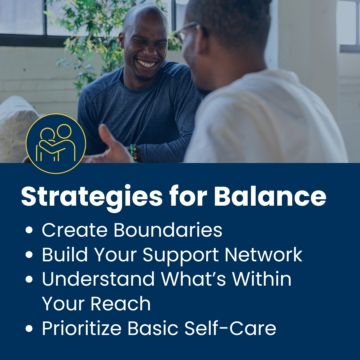Off the Clock, Still Carrying the Load: Navigating Life Stress in the Trades
The electrical trade can be a high-pressure environment that involves managing complex systems and maintaining high safety standards. The link between workplace challenges and stress in the industry has been well-established. However, the whole picture encompasses much more than job-site pressures.
Personal stressors outside of work don’t pause when people clock in. Life happens, and responsibilities and worries can weigh on anyone’s mind throughout the workday. These stressors can affect focus, safety, and overall well-being, but it’s important to remember that you’re not alone. There’s no stigma in acknowledging stress, and having tools and coping strategies can help. Being aware of your own stress also allows you to support your team and coworkers, creating a safer, more connected work environment.
Challenges & Demands Can Add Up
Electrical professionals are trained and tasked with managing complex electrical systems, troubleshooting problems under pressure, and upholding strict safety standards in demanding environments. It’s a high-responsibility role, and statistics show that 80% of people in the construction industry experience work-related stress.
When financial worries, family responsibilities, or personal struggles are added to the mix, the intersection of personal stress and professional responsibility can create a particularly challenging situation for tradespeople.
Navigating Seasonal Challenges
The approaching holiday season and winter months bring unique circumstances for many in the trades. Construction and electrical work often follow seasonal patterns, with slower periods during colder months leading to adjusted schedules or temporary project changes. This natural cycle presents both challenges and opportunities:
- Financial Planning Considerations: Reduced work hours may coincide with increased holiday expenses and seasonal costs.
- Family Time and Responsibilities: Holiday expectations, children’s needs, and family gatherings add layers of responsibility to stretched schedules and budgets.
- Seasonal Adjustments: Shorter days, cold weather, and reduced social interaction from fewer work hours can contribute to feelings of isolation and depression.
- Planning and Preparation: Periods of uncertainty about upcoming work can exacerbate anxiety.
Recognizing the Signs
Even when you try to leave it at the door, stress can show up on the job, impacting your focus, well-being, and the safety of those around you.
- Concentration variations may affect attention to detail in measurements, connections, or safety procedures.
- Communication patterns with coworkers or customers can reflect overall stress levels.
- Energy levels may fluctuate based on personal circumstances and sleep quality.
- Problem-solving approaches can be influenced by mental bandwidth and focus.
- Safety awareness remains paramount regardless of external circumstances
Understanding these patterns can help professionals make sense of the unique pressures winter months and holidays can bring.
Strategies for Balance 
The electrical trade values competence, reliability, and the ability to handle diverse situations effectively. These same qualities can be applied to managing personal challenges.
- Create Boundaries: While it’s impossible to completely separate work and personal life, establishing some boundaries can help. Consider designating specific times to address personal concerns rather than letting them consume your entire day.
- Build Your Support Network: Connect with fellow tradespeople who understand the unique challenges of the electrical field. Sometimes talking to someone who gets the pressure of both the job and life outside of it can provide a valuable perspective.
- Understanding What’s Within Your Reach: Seasonal work patterns and unexpected life events are part of the trade, but some find that planning ahead during busier months, like budgeting for slower periods, can make transitions through the season feel smoother.
- Prioritize Basic Self-Care: Adequate sleep, regular meals, and rest aren’t luxuries. They help maintain the mental and physical stamina you need. Self-care looks different for everyone, so focus on what recharges you, whether that’s spending time with family, getting outdoors, or enjoying a favorite hobby.
Professional Resources & Community Support
The trades industry offers support systems for workers and their families. The NECA-IBEW Mental Health Hub provides specialized resources explicitly designed for professionals, offering practical tools for managing stress, accessing local services, and connecting with others who understand.
Other Mental Health and Support Resources:
Become Part of Our Community
The NECA-IBEW Local 48 partnership recognizes that supporting workers’ well-being creates stronger, safer, more productive teams. Membership provides access to education, training programs, professional development opportunities, and peer support networks.
Visit our membership pages for the Oregon-Columbia Chapter of NECA or IBEW Local 48 to learn more.
This blog is intended for informational purposes only and the content here should not be considered medical advice. If you are experiencing significant stress, anxiety, or other mental health concerns, please reach out to a licensed healthcare or mental health professional.
SIGN UP FOR OUR NEWSLETTER



